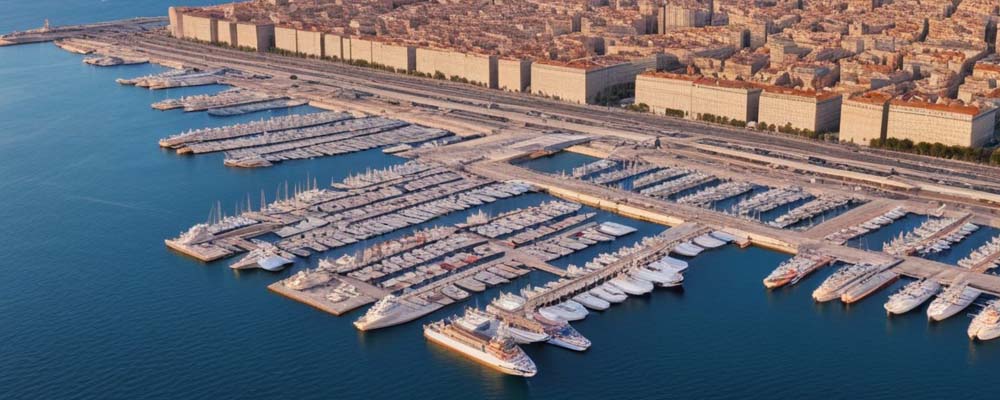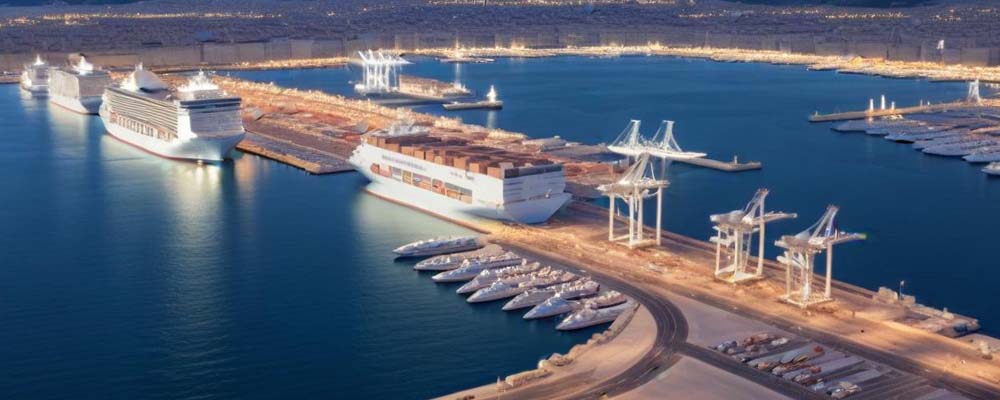
When it comes to international trade, having access to a strategic port can make all the difference. Nestled along the Mediterranean coast, the Port of Marseille stands as a pivotal gateway to Europe. This bustling harbor is not just a hub of activity but a critical link in the global supply chain. Understanding the capabilities and advantages of the Port of Marseille can be a game-changer. In this blog post, we’ll explore why the Port of Marseille is essential for your business, its unique features, and how it can boost your efficiency and profitability.
The Strategic Location of the Port of Marseille
The Port of Marseille boasts a prime location on the Mediterranean coast, making it a vital entry point to Europe. Its proximity to major shipping routes ensures swift access to European markets, reducing transit times and costs. By operating from Marseille, businesses can leverage shorter lead times and enhanced delivery efficiency.
The port’s connectivity extends beyond maritime routes. It links seamlessly with railways and highways, facilitating smooth cargo transitions between sea and land. This integrated network ensures goods move effortlessly from the port to various European destinations, making it an ideal choice for logistics providers aiming for efficient distribution.
Additionally, Marseille’s location offers geopolitical stability. Unlike some regions prone to disruptions, the Mediterranean basin experiences relatively fewer geopolitical tensions, ensuring reliable and predictable operations for businesses relying on the port.
Comprehensive Infrastructure and Facilities
One of the standout features of the Port of Marseille is its extensive and modern infrastructure. With multiple terminals dedicated to different types of cargo, from containers to bulk goods, the port can handle diverse shipments efficiently. This versatility allows businesses to streamline their operations by consolidating various cargo types in one location.
The port is equipped with state-of-the-art technology, including automated systems for cargo handling and tracking. These advancements minimize human errors, enhance operational efficiency, and provide real-time visibility into cargo status. For logistics providers, this translates to smoother operations and improved customer satisfaction.
In addition to its maritime facilities, the port offers ample warehousing and storage options. These facilities are strategically located near the terminals, enabling quick transfers and reducing the time required for cargo handling. Whether you’re dealing with perishable goods or non-perishable commodities, the Port of Marseille has the infrastructure to meet your needs.
A Focus on Sustainability
In today’s world, sustainability is a crucial consideration for businesses across industries. The Port of Marseille is committed to reducing its environmental impact through various initiatives. The port has invested in eco-friendly technologies, such as shore power and LNG fueling stations, to minimize emissions from vessels.
Furthermore, the port actively promotes sustainable practices among its stakeholders. By encouraging the use of cleaner fuels and implementing waste reduction programs, the port contributes to a greener supply chain. For companies aiming to align with environmental standards and regulations, partnering with a sustainable port like Marseille is a significant advantage.
Sustainability efforts also extend to the local community. The port engages in projects that benefit the surrounding areas, fostering positive relationships with residents and stakeholders. This holistic approach to sustainability enhances the port’s reputation and strengthens its position as a responsible and forward-thinking trade hub.
Efficient Customs and Border Services
Navigating customs regulations can be a complex and time-consuming process. The Port of Marseille stands out for its efficient customs and border services, ensuring smooth and hassle-free clearance of goods. The port’s customs authorities have a reputation for their expertise and professionalism, expediting the clearance process for various types of cargo.
To further streamline operations, the port employs advanced customs technology, including electronic documentation and automated systems. These technologies reduce paperwork, minimize delays, and enhance the accuracy of customs declarations. For importers and exporters, this translates to faster turnaround times and reduced administrative burdens.
The port also offers dedicated support services for customs brokerage. Expert agents are available to assist businesses in navigating the intricacies of customs regulations, ensuring compliance and preventing potential issues. By leveraging these services, companies can focus on their core operations while leaving customs matters in capable hands.
Innovative Solutions for Logistics Providers
Logistics providers require innovative solutions to stay competitive in a rapidly evolving industry. The Port of Marseille caters to these needs with a range of cutting-edge services and facilities. For instance, the port offers intermodal transport options, allowing seamless transfers between different modes of transportation, such as sea, rail, and road.
Intermodal solutions not only enhance efficiency but also reduce transportation costs. By optimizing routes and minimizing handling times, logistics providers can achieve significant savings while maintaining high service levels. This flexibility is particularly beneficial for e-commerce businesses that demand swift and reliable deliveries.
Additionally, the port provides value-added services, such as cargo consolidation and deconsolidation. These services help businesses optimize their shipments, reduce costs, and improve overall logistics efficiency. For freight forwarding companies, access to such solutions can set them apart from competitors and attract more clients.
Leveraging Advanced Technology for Enhanced Operations
In the digital age, technology plays a pivotal role in optimizing supply chain operations. The Port of Marseille embraces technological advancements to provide a seamless experience for its users. One notable innovation is the port’s digital platform, which offers real-time visibility into cargo status, vessel schedules, and terminal operations.
This transparency empowers businesses to make informed decisions, plan their operations more effectively, and respond swiftly to any disruptions. For customs brokers and manufacturers, having access to accurate and up-to-date information is crucial for maintaining efficient supply chains and meeting customer demands.
The port also employs IoT (Internet of Things) devices to monitor and manage cargo conditions, especially for sensitive goods like pharmaceuticals and perishables. These devices provide real-time data on temperature, humidity, and other critical factors, ensuring the integrity of the cargo throughout its journey. This capability is particularly valuable for companies dealing with high-value or temperature-sensitive products.
Competitive Advantages for Importers and Exporters
Importers and exporters can gain a competitive edge by leveraging the unique advantages offered by the Port of Marseille. One such advantage is the port’s extensive network of trade agreements and partnerships. These agreements facilitate smoother trade flows, reduce tariffs, and open up new market opportunities for businesses.
The port’s strategic location also enables importers and exporters to access a vast consumer base. With its proximity to major European markets, businesses can reach millions of customers within a short timeframe, enhancing their market reach and competitiveness. This accessibility is particularly beneficial for e-commerce businesses looking to expand their customer base.
Furthermore, the port’s efficient operations and streamlined processes translate to cost savings and faster turnaround times. Importers and exporters can minimize their logistics costs, reduce lead times, and improve overall supply chain efficiency. These advantages contribute to a more profitable and resilient business model.
The Future of the Port of Marseille
The Port of Marseille is not resting on its laurels; it continues to innovate and expand its capabilities to meet the evolving needs of the global trade landscape. Ongoing projects include the development of additional terminals, the implementation of smart port technologies, and the expansion of intermodal transport options.
These initiatives aim to further enhance the port’s efficiency, capacity, and sustainability. By staying at the forefront of industry trends and adopting cutting-edge solutions, the Port of Marseille ensures that businesses can rely on its services for years to come.
Conclusion
The Port of Marseille stands as a crucial gateway to Europe, offering strategic geographic advantages, advanced infrastructure, and seamless connectivity that significantly enhance logistics efficiency. Its commitment to sustainability, efficient customs services, and innovative solutions position it as a leader in global trade. By leveraging these strengths, businesses can achieve reduced transit times, cost savings, and improved supply chain operations, ensuring a competitive edge in the international market. Contact us for smooth transactions at the Port of Marseille as it continues to expand and innovate.









